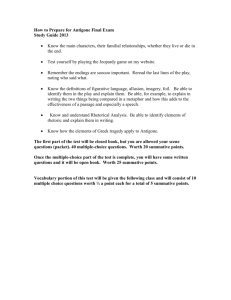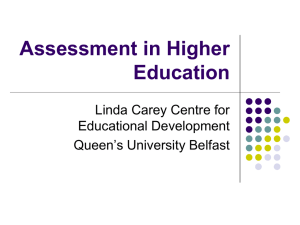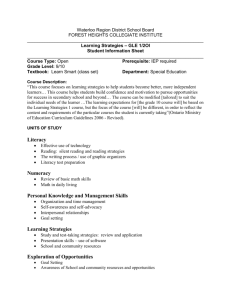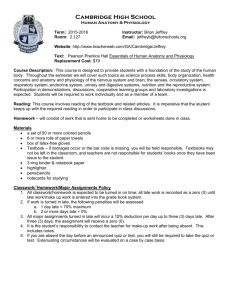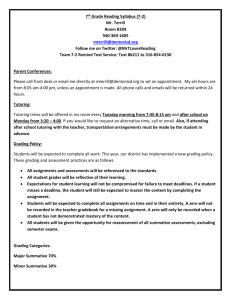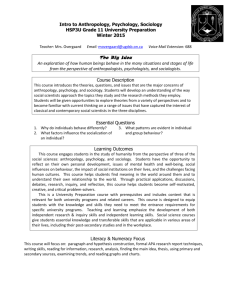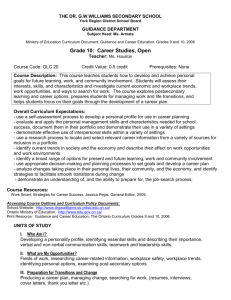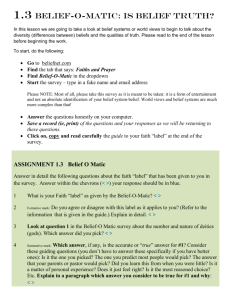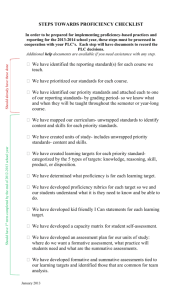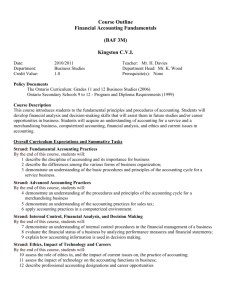day1 outline
advertisement
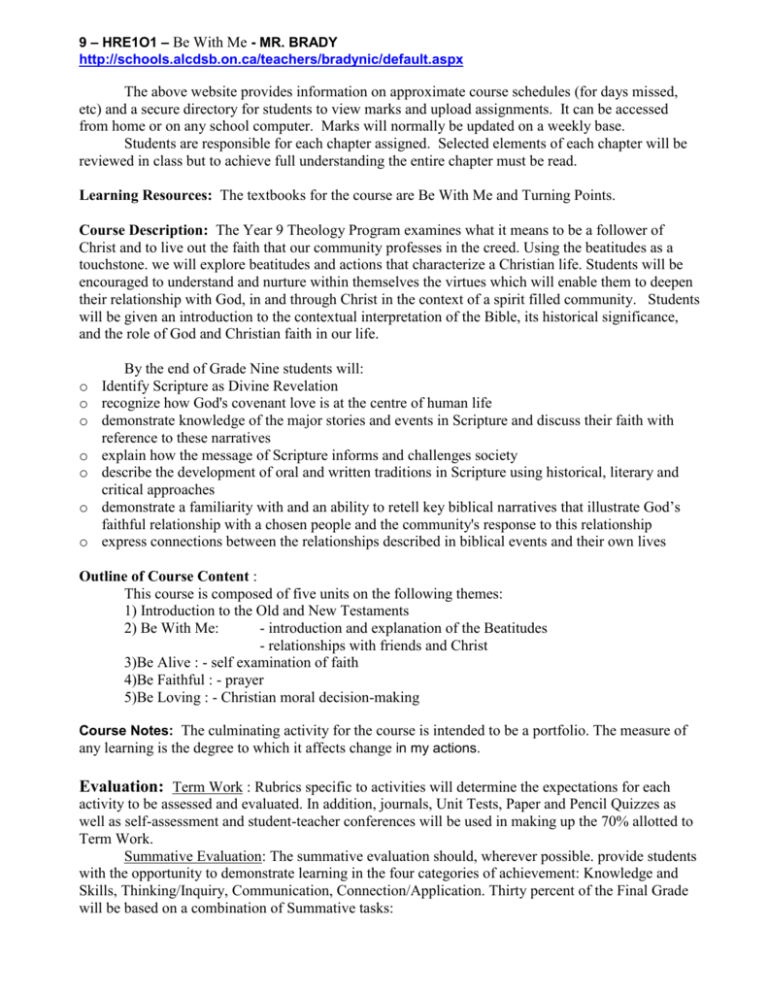
9 – HRE1O1 – Be With Me - MR. BRADY http://schools.alcdsb.on.ca/teachers/bradynic/default.aspx The above website provides information on approximate course schedules (for days missed, etc) and a secure directory for students to view marks and upload assignments. It can be accessed from home or on any school computer. Marks will normally be updated on a weekly base. Students are responsible for each chapter assigned. Selected elements of each chapter will be reviewed in class but to achieve full understanding the entire chapter must be read. Learning Resources: The textbooks for the course are Be With Me and Turning Points. Course Description: The Year 9 Theology Program examines what it means to be a follower of Christ and to live out the faith that our community professes in the creed. Using the beatitudes as a touchstone. we will explore beatitudes and actions that characterize a Christian life. Students will be encouraged to understand and nurture within themselves the virtues which will enable them to deepen their relationship with God, in and through Christ in the context of a spirit filled community. Students will be given an introduction to the contextual interpretation of the Bible, its historical significance, and the role of God and Christian faith in our life. By the end of Grade Nine students will: o Identify Scripture as Divine Revelation o recognize how God's covenant love is at the centre of human life o demonstrate knowledge of the major stories and events in Scripture and discuss their faith with reference to these narratives o explain how the message of Scripture informs and challenges society o describe the development of oral and written traditions in Scripture using historical, literary and critical approaches o demonstrate a familiarity with and an ability to retell key biblical narratives that illustrate God’s faithful relationship with a chosen people and the community's response to this relationship o express connections between the relationships described in biblical events and their own lives Outline of Course Content : This course is composed of five units on the following themes: 1) Introduction to the Old and New Testaments 2) Be With Me: - introduction and explanation of the Beatitudes - relationships with friends and Christ 3)Be Alive : - self examination of faith 4)Be Faithful : - prayer 5)Be Loving : - Christian moral decision-making Course Notes: The culminating activity for the course is intended to be a portfolio. The measure of any learning is the degree to which it affects change in my actions. Evaluation: Term Work : Rubrics specific to activities will determine the expectations for each activity to be assessed and evaluated. In addition, journals, Unit Tests, Paper and Pencil Quizzes as well as self-assessment and student-teacher conferences will be used in making up the 70% allotted to Term Work. Summative Evaluation: The summative evaluation should, wherever possible. provide students with the opportunity to demonstrate learning in the four categories of achievement: Knowledge and Skills, Thinking/Inquiry, Communication, Connection/Application. Thirty percent of the Final Grade will be based on a combination of Summative tasks: o a Portfolio/summative project (10%) o a Final Exam (20%) Term Work: 70% Category Knowledge/Understanding Thinking/Inquiry Communication Application Total Weight 1 1 1 1 70% Final Evaluation: 30% Task Weight Portfolio/Paper 1 Final Evaluation 2 Total 30% Problem Evaluations (Extracts from School Board Evaluation Policy) All summative evaluation activities are due on the date specified by the teacher. Once assignments (class set) have been returned to the students, a teacher is under no obligation to accept a late assignment. In cases of chronic lateness, a teacher may use small mark penalties/deductions (i.e., one level, no more than 10 % of the final grade) which do not distort achievement or motivation. If a student misses a summative evaluation, it is the student’s responsibility to discuss the completion of the activity and subsequent consequences with the teacher on the day of the student’s return to school. Extenuating circumstances may warrant, at the teacher’s discretion, an extension or an alternative demonstration of the expectations. (Mr Brady’s interpretation – an incomplete will be assigned until the student clears up the problem). Where a student has missed or failed to submit an evaluation activity and therefore has provided no evidence of achievement, the teacher will record an I to indicate incomplete. These Incompletes (I) will be taken into consideration when determining the mid-term and semester end grade. R 45 - Indicates that the student is able to achieve some course expectations in limited ways. However, achievement is insufficient to warrant granting a credit. 40 - Indicates that the student has difficulty achieving most of the course expectations. 35 - Indicates that the student has difficulty achieving any course expectations I 30 - If the student has missed a sufficient number of evaluations such that, in the teacher’s professional judgment, there is insufficient evidence to make a valid and reliable evaluation of student achievement, a percentage grade of 30% will be assigned. 20 - In rare cases, teachers may assign 20% at mid-term as a symbol to indicate that little or no evidence of achievement has been provided by the student and that a valid evaluation of student achievement is not possible. In most cases, this would apply to non-attending students. Late Projects: Students can expect the following: assignments submitted on the date due will be collected submissions one school day after due date will receive a 5 % mark deduction assignments handed in two school days late with a 10 % mark deduction, after which time there will be no further opportunities to hand in the assignment for marking. It may still be handed in to keep the opportunity for exemption open. Exemption from Exam Students who hand in all major projects, demonstrate a solid work ethic in class and achieve a mark of 75 or over can be exempt the final exam. This is contingent on teacher approval and not automatic. All students who do not hand in a major project will be writing the exam.
